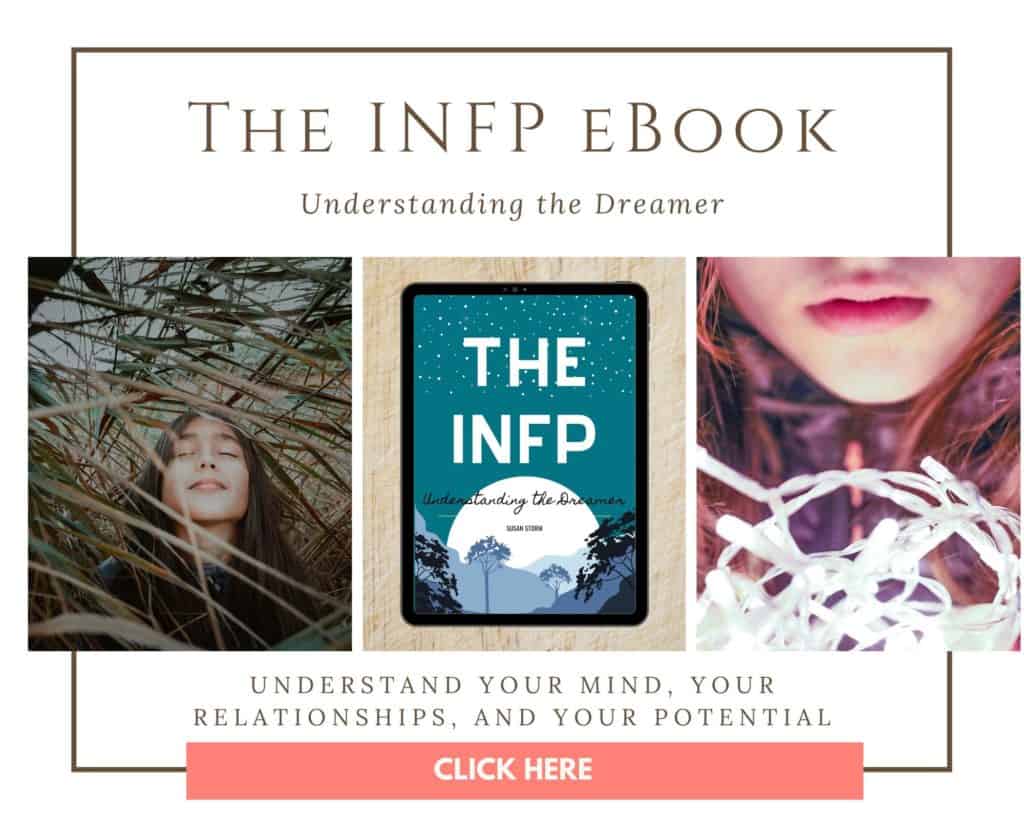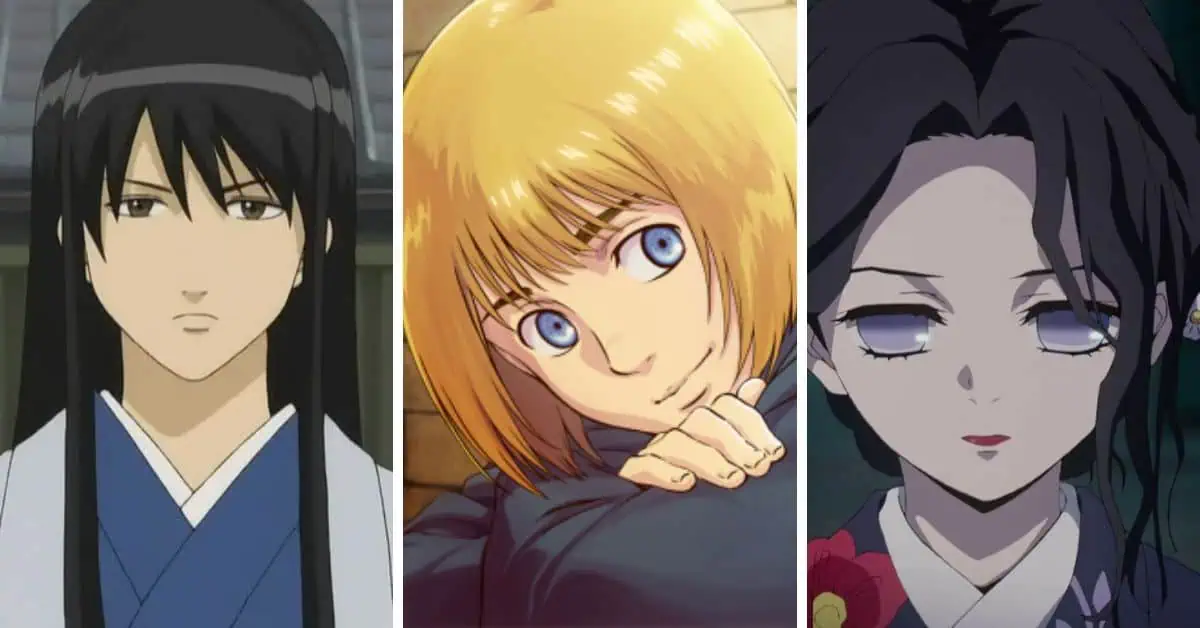Your INFP Personality Type and Your Enneagram Type
When it comes to personality type, there are literally no two people who are exactly the same. You might perceive the world using the same functions or share attributes with other feeling or thinking types, but no one can completely replicate you. One of the reasons there can be such drastic differences between people of the same Myers-Briggs® personality type lies in the enneagram system. There are nine different enneagram types, each having their own core desires, fears, and behaviors. An average INFP Nine might be laid-back, conflict-avoidant, and whimsical, whereas an average INFP One might be a perfectionist, high-strung, and critical. Today we’re going to explore some of the drastic differences between each of the enneagram types as expressed by the INFP personality type.
Not sure what your enneagram type is? Take our new personality questionnaire here!

Table of contents
- Your INFP Personality Type and Your Enneagram Type
- The INFP Type One – The INFP Perfectionist
- The INFP Type Two – The INFP Helper
- The INFP Type Three – The INFP Achiever
- The INFP Type Four – The INFP Individualist
- The INFP Type Five – The INFP Investigator
- The INFP Type Six – The INFP Loyalist
- The INFP Seven – The INFP Enthusiast
- The INFP Type Eight – The INFP Challenger
- The INFP Type Nine – The INFP Peacemaker
- References:
Estimated reading time: 18 minutes

Your INFP Personality Type and Your Enneagram Type
The INFP Type One – The INFP Perfectionist
Core Fear: Being corrupt, bad, or defective
Core Desire: Being good and having integrity
Perfectionism and idealism combine in this rare personality type combination. The INFP One believes in a higher calling and is motivated to use their creativity and imagination to improve the world. Holding themselves to high standards, these types can struggle with excessive self-criticism and ideals that seem forever out of reach. They are often interested in politics, journalism, animal rights, and social justice. Conviction and determination are hallmarks of these types. At healthy levels, these types are accepting, wise, principled, and responsible. They are the ones who write letters to their politicians asking them to end corrupt practices. They’ll do anything to improve the world – setting goals and doing everything in their power to reach them. Unhealthy INFP Ones will be self-righteous, inflexible, punitive, and obsessive. They are unwilling to accept other people’s values and perspectives because they are so wrapped up in their own.
Because Ones are in the Instinct/Anger triad of the enneagram, they tend to experience a lot of anger. However, rather than unleashing their anger on others immediately, they tend to repress it. It often shows up in gritted teeth, clenched fists, and condescending statements. They are typically harder on themselves than they are on others, but can seem overly-critical of both.
Unhealthy Ones Are: Judgmental, Self-Righteous, Bitter, Overworked, Defensive, and Prone to Black-and-White Thinking. At this stage, Ones feel that they will never be “good enough.”
Average Ones Are: Serious, Driven, Purposeful, Organized, Punctual, Irritable, Tense, Opinionated, Sarcastic, Hard-Working, Responsible, Dedicated.
Healthy Ones Are: Sensible, Grounded, Moderate, Objective, Accepting, Hopeful, Wise, Discerning, Joyful, Humble, Playful.
The INFP Type Two – The INFP Helper
Basic Fear: Of being unloved, worthless, or unwanted
Basic Desire: To know they are loved
Generosity and warmth are hallmarks of the INFP Two. These types will go above and beyond to reach out to people and help them. More gregarious than the typical INFPs, Twos of this type feel a deep need to connect with others and support them emotionally. They are tuned into their empathy, finding unique possibilities that will help people. INFPs of this enneatype need to be careful that they don’t burn out from socializing and giving to people. As introverts, it’s crucial for them to get regular alone time to reflect on their individual needs and values. While most INFPs are deeply individualistic, INFP Twos will be more other-centered – finding ways to connect with others and see what everyone has in common.
In childhood, Twos were often taught to put other people’s needs ahead of their own. They sensed that they had to earn a place in other people’s affections or repress their own needs to attend to others. AS a result, they personified the selfless friend, nurturer, and people-pleaser. In short, they grew up feeling like they must sacrifice themselves in order to earn love.
Because Twos are in the Shame/Heart triad of the enneagram, they tend to struggle with underlying feelings of worthlessness. They worry that if they stop being selfless that they will have nothing worthwhile to offer the world. On the flip side, they can also experience pride because they feel like other people couldn’t get by without them. However, that sense of pride is very fickle and there tends to be underlying feelings of shame, grief and hurt that they try to ignore. As Twos become healthier, they learn to process their shame. They learn that they are allowed to take care of themselves and their own feelings and needs. With this understanding, they become more joyful, self-accepting, and relaxed. They no longer feel like their worth revolves around other people affirming them, because they know they are enough as they are. Their introverted feeling side takes a more prominent place in their lives and they become more in touch with their core values, needs, and ideals.
Unhealthy Twos Are: Desperate, Victim-Minded, Overbearing, People-Pleasing, Manipulative, Over-worked, Angry, Hurt, Exhausted, Insecure, Prideful.
Average Twos Are: Selfless, Proud, Complimentary, Supportive, Helpful, Nurturing Flattering, Insecure, Responsible, Well-Intentioned, Possessive.
Healthy Twos Are: Generous, Supportive, Expressive, Self-accepting, Joyful, Humble, Imaginative, Creative, Insightful. They prioritize themselves rather than always putting others first.
The INFP Type Three – The INFP Achiever
Core Fear: Of being worthless without success and achievement.
Core Desire: To feel desired, successful, and accepted.
Threes of this type are deeply in touch with their intuition, seeing possibilities that they can’t wait to achieve. Hard-working and goal-oriented, they will go to great lengths to achieve success and a sense of accomplishment. Unfortunately, this often means they stifle their feeling side – caring less about their inherent values and emotional needs, and putting on a façade in order to achieve their goals. At healthy levels, these INFPs put their determination and confidence behind world-changing initiatives. They may be spokespeople for charities or therapists who help people see their potential. The world around this INFP is filled with unmet potential that they want to chase. Average Threes are determined not to be forgotten or unimportant. They refuse to be “Nobodies” and often have the perfectly curated Instagram or Facebook pages. They seem to inherently know how to market themselves to be desired.
In childhood, Threes believed that they weren’t valued for their true selves. By achieving, succeeding, and accomplishing they learned to receive the affirmation they so greatly needed. As a result, they became obsessed with achieving benchmarks and accomplishments as a way to feel worthwhile. They learned to focus more on their outer self than their inner self. Wearing the right clothes, getting the right grades, and saying the right things – these all became a priority. They worried that without certain markers of success they’d be worthless and unlovable.
Because INFPs are introverts and have such deep and nuanced inner worlds, it’s vital for them to form their own benchmarks for success. INFP Threes often feel burned out, detached from their true self, and overworked. It’s crucial if you’re a Three of this type to make time for solitary reflection and authenticity with yourself. Realize when you’re putting on a façade for other people and make efforts to connect with your core values. Realize that you are inherently valuable and find friends who love you for YOU.
Unhealthy Threes Are: Show-Offs, Depressed, Empty, Angry, Attention-Seeking, Confused, Vain, Deceitful, Overly-Competitive, Burned-Out, Afraid of Intimacy.
Average Threes Are: Over-Achievers, Ambitious, Self-Doubting, Self-Promoting, Competitive, Hard-Working, Arrogant, Creative, Visionary, Determined, Restless.
Healthy Threes Are: Confident, inspiring, creative, genuine, self-accepting, benevolent, visionary, imaginative, insightful, and/or empathetic. These threes explore their true identity and discover what they actually want rather than what society labels as “success.”
The INFP Type Four – The INFP Individualist
Core Fear: Being insignificant and without identity.
Core Desire: To find their significance and unique identity.
Introspective and imaginative, The Four is one of the more common INFP enneagram types. Deeply individualistic and original, these types long to create something one-of-a-kind in the world. They strive to find their identity, but no matter how hard they try it always feels slightly out of reach. In an effort to discover their true selves, they are willing to brave the depths of their soul and face their darkest motives, fears, and failings. While many other types avoid looking at their faults, Fours fixate on them, often pouring their pain and authenticity into writing, works of art, or some other creative channel. In their depth of honesty, Fours are often unmatched and can struggle to find like-minded people who are as sincere as they are.
In childhood, Fours often felt out of place in their homes. In fact, many recall that they wondered if they were adopted because of how different they felt. Because they didn’t see their preferences and gifts mirrored in anyone else, they grew up feeling isolated and misunderstood. They often wondered if there was something wrong with them – thus they embarked on a lifelong “quest for self” in order to understand their true identity. As a coping mechanism, they often develop fantasies of being “seen” by a rescuer or someone who will finally understand them and appreciate who they truly are.
Fours are in the Shame/Heart triad of the enneagram. While Twos try to hide their shame by earning love, and Threes try to minimize their shame through achievement, Fours actually delve into their shame. They find it nearly impossible to avoid their feelings – in fact, they may purposefully stir up feelings that are familiar to them, even if they are scary or painful. Fours crave the intensity of feeling – because they hope that it will draw them closer to their true identity.
Unhealthy Fours Are: Self-destructive, unrealistic, depressed, self-loathing, self-sabotaging, wasteful, apathetic, fatigued, listless, envious, and/or lost in fantasies.
Average Fours Are: Imaginative, self-conscious, melancholy, envious, introspective, aesthetically-motivated, self-absorbed, sensitive, empathetic, and/or visionary.
Healthy Fours Are: Creative, eloquent, imaginative, insightful, authentic, honest, forgiving, revealing, empathic, accepting, and grateful. They don’t feel a need to be different – they know that there is only one of them and they are good enough as they are.
Read This Next: Why INFPs and INFJs Are Drawn to Sad Things
The INFP Type Five – The INFP Investigator
Core Fear: Being helpless, incompetent, or overwhelmed.
Core Desire: To be competent and capable.
Curious and contemplative, INFP Fives are driven to attain knowledge and have mastery in a unique field. They want to understand how the world works – whether it’s the world of music, animals, or the inner world of their imagination. Not afraid of skepticism, they tend to question rules and beliefs that are handed to them – needing to know the ins and outs before they accept it as fact. Deep down, INFP Fives worry that they can’t do things as well as others and that they may not have the skills needed to “make it” in the world. Thus, they search for mastery and data as a way to arm themselves against whatever life might throw at them. Internalizing their knowledge helps them to feel self-confident and more certain. The only problem with this is that Fives tend to hoard knowledge so desperately that they risk never feeling like they have enough to face the world. They often are reclusive, eccentric, and misunderstood. But as they mature and become healthier, they can astound people with their original and innovative ways of seeing the world. They are typically deeply intuitive and insightful.
In childhood, Fives often felt unsafe in their homes. This lack of safety may have been emotional or physical – but often they recall feeling overwhelmed by their parents. They often felt that there was no place for them to fit in. Like the Four, they felt out of touch and misunderstood by members of their family. To cope, they withdrew from their families, searching for something all their own that they could “bring to the table.” If their siblings were all good at math, they’d learn to be good at creative writing, or vice versa. They need to differentiate themselves from others by becoming masters at something unique. Often highly reclusive, they dislike being “crowded in” by others. They need their alone time and can become very frustrated when very much is asked of them.
Fives are in the fear/head triad of the enneagram. In solitude, they face their fears, and may even fixate on them. They might draw pictures of scary monsters that terrify them or read stories about horrible events that cause them anxiety. They tend to have an attraction to the “darker side” of life and to fully immersing themselves in the things that scare them. It’s important for INFP Fives to reach out to others and to become comfortable sharing their inner world. Becoming isolated can get Fives lost in a feeling of emptiness and meaninglessness. INFPs need to explore the world around them and get to know others in order to achieve balance.
Unhealthy Fives Are: Escapist, eccentric, insomniacs, stuck in analysis-paralysis, afraid, reclusive, secretive, argumentative, under-nourished, fearful, and/or removed from their feelings.
Average Fives Are: Insecure, high-strung, cerebral, secretive, skeptical, resentful, imaginative, creative, misunderstood, private, pre-occupied, conceptual, observant, and/or intelligent.
Healthy Fives Are: Competent, strong, curious, original, artistic, inventive, original, independent, clear-minded, profound, engaged, grounded, compassionate, perceptive, and/or productive.
The INFP Type Six – The INFP Loyalist
Core Fear: Of being abandoned or without support.
Core Desire: To find security and support.
Full of contradictions, the INFP Six looks for a sense of security and support in a world that feels ever-shifting and unpredictable. They can waver between being rebellious to rule-following, non-confrontational to aggressive, argumentative to agreeable. They can feel sad then joyful, strong and weak at the same time, confident and insecure all at once. The reason for this is that their anxiety causes them to bounce back and forth from one psychological state to another. When they feel hopeful about a relationship, a skeptical voice inside will ask them whether the person they’re dating can really be trusted. When they attend a church they love, they might worry that the pastor is taking advantage of their followers. Although they can be imaginative, loyal, hard-working, and funny, they can also feel lost in a sea of uncertainties. They often struggle to trust themselves, looking for an authority, reference, or support group who can help them to make decisions. In a sense of community, they hope they will be able to anchor themselves in something trustworthy and dependable.
In childhood, Sixes often felt connected to the protective figure in their home. They look for approval and guidance from this figure (whether it’s a parent or mentor) and believe that if they get enough guidance or support they can finally become independent. They abandon their own inner guidance and feel cut off from it, especially if the protective figure was abusive in some way. As a result, they feel like they must constantly look outside themselves for direction and guidance. However, they often feel skeptical and guarded against authority as much as they might seek it. So they can get caught running in circles trying to find something or someone to believe in.
Sixes are in the thinking/Head triad of the enneagram. They spend a great deal of time thinking and analyzing, but they don’t trust their own thinking. They have to constantly evaluate ideas that contradict their original ideas so that they are covering all their bases.
Unhealthy Sixes Are: Plagued by guilt, self-punishing, self-destructive, paranoid, insecure, delusional, obsessed with fears, panicky, helpless, and depressed.
Average Sixes Are: Supportive, authority-seeking, authority-questioning, anxious, pessimistic, cautious, impulsive, indecisive, skeptical, cynical, dutiful, and/or hard-working.
Healthy Sixes Are: Responsible, committed, practical, well-disciplined, insightful, visionary, friendly, trustworthy, hard-working, grounded, serene, and brave.
The INFP Seven – The INFP Enthusiast
Core Fear: Of being in pain or deprived.
Core Desire: To be happy, satisfied, and have their needs fulfilled.
Fun-loving and excitable, the INFP Seven is deeply in touch with their intuitive side. They see possibilities all around them and chase after them with restless enthusiasm. There’s always more to explore, more to experience, and more to create. In their quest for fulfillment and fun, they may wear themselves out – feeling like happiness is permanently just out of reach. At other times, they can be deeply joyful and content – especially as they become healthier and more mature. These INFPs are typically wanderers, searching everywhere for meaning and satisfaction and new sensations. They want to experience pleasure and gratification through using their intuition and feeling sides to evoke a sense of exhilaration and wonder with the world around them.
In childhood, Sevens often felt disconnected from the nurturing figure in their life (typically the mother, but sometimes a different person). As a result, they tried to nurture themselves with distractions and toys to keep themselves content. They looked away from their underlying anxiety, trying to look towards happy, exciting opportunities and possibilities.
Because Sevens are part of the Head/Fear triad, they have underlying issues with fear and anxiety. Unlike the Six, who tries to deal with their anxiety through hyper-vigilance, Sevens repress their anxiety through seeking fun, adventure, possibilities, and re-framing negatives into positives. INFP Sevens experience the best growth when they can learn to be still with their thoughts, meditate, and accept with their feelings.
Unhealthy Sevens Are: Escapists, Impulsive, Hedonistic, Childish, Joyless, Reckless, Scattered, Unstable, Overwhelmed, Paralyzed.
Average Sevens Are: Impatient, Imaginative, Self-Centered, Enthusiastic, Excessive, Creative, Distracted, Adventurous, Materialistic, Restless, Skilled at Multi-Tasking.
Healthy Sevens Are: Grounded, Bold, Realistic, Charismatic, Visionary, Appreciative, Joyful, Satisfied, Helpful, Profound.
The INFP Type Eight – The INFP Challenger
Basic Fear: Being controlled or violated by others.
Basic Desire: To determine their own course in life. To protect themselves.
Independent and self-reliant, INFP Eights will do nearly anything to stand up for their beliefs. They are typically more confrontational and aggressive than most INFPs, fighting for what they believe in; particularly underdogs or those they see as victimized. However, Eights refuse to be victims themselves. They hate being controlled, told what to do, or having their freedoms stepped on in any way. They chase after courage, self-reliance, leadership, and autonomy – determined that nobody will strip them of their rights and freedoms. These Eights have a strong need to defend the underdogs. Because personal autonomy is so vital to their well-being they strive to attain that for others.
In childhood, INFP Eights felt they had to grow up quickly. They may have dealt with abandonment, abuse, or just poor leadership. They didn’t feel comfortable being vulnerable, and survival became a core concern rather than playing and enjoying the beauties of childhood. As a result, these INFPs developed a thick skin and a tough outer exterior to try to survive life. INFP Eights tend to have difficulty typing themselves accurately because most of the stereotypical INFP descriptions won’t fit them. They have tougher edges than most descriptions would imply.
Eights are in the Gut/Instinct triad of the Enneagram. This means that they have underlying issues with anger. While Nines avoid their anger and Ones work to repress it, Eights express their anger. They like straight-talk and directness and tend to be assertive. When threatened or controlled they can become explosive and intimidating. They feel very defiant of any institution that tries to control them – and they may make life choices simply to rebel against that institution.
Unhealthy Eights Are: Destructive, Vengeful, High-Tempered, Rejecting, Private, Hardened, Authoritative, Bossy, and/or Confrontational.
Average Eights Are: Resourceful, Businesslike, Competitive, Boastful, Willful, Proud, Bad-tempered, Hard-Working, Independent, Visionary, and/or Determined.
Healthy Eights Are: Courageous, Heroic, Forgiving, Energetic, Independent, Action-Oriented, Resourceful, Direct, Protective, Generous, Inspiring, Strategic, Decisive, Self-Confident, and/or Authentic.
The INFP Type Nine – The INFP Peacemaker
Basic Fear: Of fragmentation, loss, or separation.
Basic Desire: To have inner harmony, stability, and peace of mind.
Laid-back and open-minded, the INFP Nine embraces all the whimsical imagination and beauty that can be enjoyed in life. They are highly tolerant and often empathetic to the needs of other individuals. They are very in touch with their intuition – seeing positive ways to reframe situations and looking for the silver lining during any tough time. The struggle for INFP Nines is that they tend to be relatively out of touch with their own desires and needs. They may “go with the flow” in order to keep the peace, only to resent it later. They can also have difficulty speaking up about what they want, asserting themselves, or setting boundaries. In the midst of tense situations they may “numb out” in order to keep a sense of inner calm and stability. As an example, the INFP Nine might have experienced something traumatic in their childhood only to disassociate with what was happening and think of something more mentally calming.
In childhood, Nines learned to cope with pain by dissociating from threatening and traumatic events in their environment. This doesn’t mean that all Nines had traumatic childhoods, but regardless of what happened, they internalized the belief that if they were undemanding and low-maintenance they would be safe and keep everything even-keeled. They felt that if they asserted themselves and made their inner feelings visible that they would create more problems. They would often stay in the background, repressing their anger, will, and desires.
Because Nines are in the Gut/Anger triad of the Enneagram they have underlying struggles with Anger. However, unlike Eights, Nines don’t express their anger outright. They tend to repress it, feeling that if they expressed it they might fragment or destroy everything inside them. Anger feels dangerous to the Nine, so instead they bury it beneath proverbs, happy thoughts, and fantasies. They manage stress by downplaying their own will and choices, opting many times to do what other people want to maintain harmony and peace. However, underneath their pleasant demeanor, they may have a storm brewing – anger that has been suppressed and suffocated for days, weeks, or even years.
Unhealthy Nines Are: Withdrawn, Unrealistic, Dissociated, Disoriented, Numb, Helpless, Repressed, Neglectful, Lazy, Ineffectual, Depressed, and/or Listless.
Average Nines Are: Agreeable, Kind, Routine-Oriented, Amicable, Deflecting, Resigned, Appeasing, Complacent, Disengaged, Compassionate, Dismissive of Pain.
Healthy Nines Are: Patient, Level-Headed, Imaginative, Inspiring, Self-Possessed, Serene, Present, Dynamic, Easy-Going, Kind, Patient, Peaceful, Comforting, and/or Spiritual.
Read This For More Information: The INFP Enneatype Nine
What Are Your Thoughts?
Did you relate to any of these types? Do you have any insight or experience to share? Let us know in the comments!
Find out more about your personality type in our eBooks, Discovering You: Unlocking the Power of Personality Type, The INFJ – Understanding the Mystic, and The INFP – Understanding the Dreamer. You can also connect with me via Facebook, Instagram, or Twitter!
References:
The Wisdom of the Enneagram: The Complete Guide to Psychological and Spiritual Growth for the Nine Personality Types by Don Richard Riso and Russ Hudson (1999, Bantam Books)














Wow this is very accurate! I really enjoyed reading your articles! I always hang out in this site whenever I don’t have things to do. Make me feel like I’m in safe place as you understand what I feel in every angle. Thank you for your hard work! 🙂
I am definitely the INF type nine, with a dose of unhealthy, average, and healthy nine. You’re also right about childhood trauma, there are some situations that I steer away from due to my childhood, even if the experience was not the same, but the pain was. This was actually a good post.
This is SO interesting, Susan! Please do INFJ next (I’m an Enneagram 4 INFJ). Thanks!
INFP 9 fits me perfectly
Yup. I work with two other INFPs and I’ve often wondered to myself, are they really INFPs? Am I really an INFP?? But this made it so clear that, while they probably have the same cognitive functions as I do, their enneagram-type is just different to mine. I really enjoyed reading this and seeing them and myself in the descriptions. We’re so very much alike, yet so different ????
Very informative, Susan! Thank you!
WoOow I love you susan.
God bless u with ????????
U’re website is incredible.
Thank you for being this good.
I always wondered what the hell I am and today just knew that I’m a fucking blessed INFP with 8 enneatype.
Thank you so much! I’m really glad that you enjoyed this article 🙂 And INFP 8s are so rare!! Wow!!
Is infp 8 even possible?????
Yes, I am here because I am one. It is very very possible lol 😉
Thank you very much for making this!
I am an INFP and from the tests and my own assessment, I believe I am a 1w2. I am very focused on my many Fi values and living a life in tandem with them. I am quick to blame myself as I set high ideals and feel many a times I do not live up to them. I have been very reluctant to accept that I am a 1 even though it feels so accurate (painfully so). There are certain aspects to the 1w2 that make me feel more like a TJ even though I know I’m not. This page has helped me greatly come to terms with a part of myself that sometimes wish were not true. I feel like a bit of a contradiction at times.
I totally am an INFP 8, i always felt like something was off with the descriptions but now it makes sense, specially counting with the fact that i’m an aries
Love this! I’m fascinated with both Enneagram and MBTI. When I read about INFPs online, most are Enneagram 4 and I don’t always relate as a 9. I also think Enneagram subtypes and wings are important in understanding differences, and maybe tritype as well. Enneagram gives us a path for growth towards health, as well as empathy for ourselves and others.
I feel like I have a piece of each type.
Same here!
Wow, I never realized an INFP could really be any of the Enneagram types! For some reason that just never clicked. Awesome and enlightening post!!
I wonder if anyone else felt like they had many 4, 5, and 6 traits thrown together. I only settled on 4w5 because of how consumed I am by shame and the obsession with personality types and archetypes (along with that stereotypical idea of being different). It’s funny because a 4 is neurotic by nature while a 5 is more unemotional, even cold.
I’ve read that it’s typical for INFP’s to be 4w5 while INTP’s are more likely to be 5w4, and INTJ’s tend to be 5w6. I prefer to understand this system with the wings only because fixations and tritypes can be confusing.
I still don’t really know which one I am because I feel like a mix of 4, 5 and 9. They all apply equally.